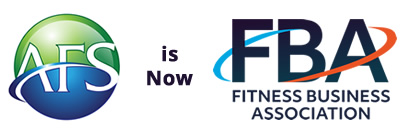 By Liz Callham, AFS Community Expert
By Liz Callham, AFS Community Expert
As personal trainers and coaches, it is essential that we find out the “why” when it comes to our clients. Why are they training? Without this information, it is almost inevitable that one day that client will walk away from training with you. So, what are the main areas of motivation for clients?
There are four categories of client we’ve all seen. They want to change their appearance, relieve pain, feel healthier, and/or train or prepare for an event. Although clients have different motivations, the key to managing them is simple - you want to ensure you show progress with each type of client.
Also, every 3-4 months, you want to communicate with clients regarding new motivations that pop up. For instance, a client who came to you in pain, who is currently pain free, may now want to train for an event. Or a client who is feeling healthier may have aspirations to lift more in the weight room. As you have clients longer, eventually motivations change or evolve. Let’s take a look at these clients...
Changing Their Appearance
When it comes to changing their appearance, this will boil down to getting bigger or smaller. These clients will need to be assessed in numerous ways, including measurements, starting points in the weight room (i.e. starting weight on machines, how many push-ups they can perform, etc.) and some form of food analysis.
This will allow you to show progress in numerous ways. For example, you may see a change in measurements before any changes on the scale, or better physique results from improved nutrition choices before progress in workouts.
Clients In Pain
For clients in pain, it’s crucial to assess their starting points of range of motion, pain threshold and quality of life. These are the clients you will inevitably have to give boundaries to, at least in the beginning, to avoid back pedaling all of their hard work.
For example, if you have a client who comes in with low back pain due to working out too hard, you need to provide guidelines on his/her other workouts to ensure they don’t overdue it on their own. These are also clients you need to build trust with quickly, and teach them the difference between pushing through pain and doing something that will actually progress them forward.
While there are many different client motivations, managing them is simple. Show them results, with strong communication along the way.
I Want To Be ‘Healthier’
We love clients who come in and want to be “healthier.” With them, the first rule is to create meaning behind this. We want to avoid being too general as that will make it difficult to show progress. Most likely this person wants to improve their quality of life and make working out part of their daily routine. They are probably new to working out, so when it comes to assessments, keep it basic.
A basic assessment may include taking measurements, recording current weight, assessing mobility, and weights used during basic exercises. These clients can be tricky, so make sure to keep communication lines open. You may also want to record detailed notes of all workouts to show improvement. It takes at least 30 days for people to add new habits to their lives. Those first 8-10 workouts will be important in getting the buy-in from them.
Preparing For An Event
Clients who are preparing for an event need to be treated like athletes. Ensure that they have fully committed to an event (i.e., already registered) and that you have created a timeline from now until the day of the event, as your assessments will be based off of the type of event.
For example, if you have a runner, perform a time trial in the first two weeks of training so you know how to map out the remaining workouts. These clients tend to be self-motivated, so your job is just ensuring they are sticking to the plan and not doing more or less. An example of progress for these clients would be small milestones up to the event.
While there are many different client motivations, managing them is simple. Show them results, with strong communication along the way. This will alleviate motivation issues and improve your client retention!
Liz Callham received her Bachelor’s Degrees from Illinois State University in Exercise Science and Public Relations and also completed a Masters in Business and Administration from DePaul University. She holds certifications as a Certified Strength and Conditioning Specialist from NSCA and Health Fitness Specialist through ACSM. She also sits on the Advisory Board for the Exercise Science Department at ISU.


Join the Conversation!